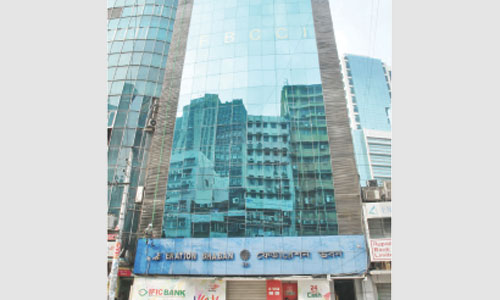Govt wants anti-dumping cell at FBCCI to protect trade interest
The commerce ministry has requested the Federation of Bangladesh Chambers of Commerce and Industry to form an anti-dumping cell at the apex trade body to uphold the country’s trade interest amid increased risks of facing anti-dumping duty on export of Bangladeshi products on the international market in future.
Such cell will also play a role in developing skilled human resources and make the businesses competent in facing the challenges of imposition of anti-dumping duty by any country in future, the ministry said.
Pakistan has already imposed anti-dumping duty on import of hydrogen peroxide, a textile chemical, from Bangladesh while neighbouring India has also initiated a move to impose such duty on import of hessian fabric, sack bags and jute yarn and other jute products.
Commerce ministry senior secretary Hedayetullah Al Mamoon has recently wrote a letter to FBCCI president Abdul Matlub Ahmad to take necessary step to form the cell.
According to the World Trade Organisation, an importing country imposes the duty on import of goods if it gets proof upon investigation that a foreign company has dumped the goods to the country through export and such dumping has caused or is causing material injury to the domestic industry and there is a causal link between the dumping and the injury found.
Anti-dumping duty cannot be imposed if the conditions are not met.
Dumping occurs when a company exports a product to any country at prices lower than the normal value (the domestic price or the cost of production) of the product on its domestic market.
In the letter, the commerce secretary said that Pakistan imposed the anti-dumping duty on hydrogen peroxide though the Bangladesh Tariff Commission and relevant exporters took sufficient measures to stop the move of Pakistan.
India is also running investigation upon imposing such duty on jute goods including hessian fabrics, jute yarn and sack bags, he said.
‘Bangladesh will have to face more such cases in future,’ Mamoon warned.
The country, both at public and private levels, has lack in necessary capability, skills and experiences in facing such cases of anti-dumping or anti-subsidy matters as these are the new issues for Bangladesh, he said.
In this context, the stakeholders including the government and private sectors will have to increase their capability in this connection, Mamoon added.
He said that businesses could set up institutional structure to increase their skills and capability to protect their business interest from anti-dumping duty on the international market while trade bodies could also take steps to enhance skills and increase awareness among businessmen on the issue.
Officials at the Bangladesh Tariff Commission said that the commission assisted the traders to face any move of the importing countries to impose such duty on export from Bangladesh.
The commission, which deals the issues related to anti-dumping on behalf of the commerce ministry, also recommends that the government upon investigation could impose such duty if any country dumps any product to Bangladesh.
The BTC has also taken various steps to enhance skills of the government’s trade officials and traders to face the issues and formulated necessary guidelines for traders, the commerce secretary said.
News Courtesy: www.newagebd.net











